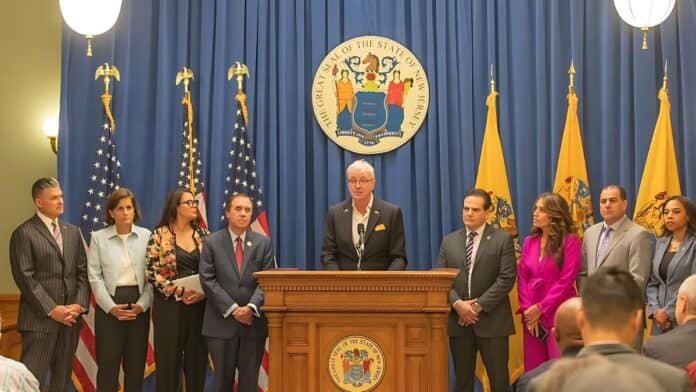Governor Phil Murphy signed the new $56.6 billion state budget for New Jersey, which includes a significant tax increase on large corporations and substantial funding for property tax relief, public schools, pensions, and community projects.
Key Takeaways:
- The budget introduces a 2.5% tax on large companies to fund NJ Transit, making New Jersey’s business taxes the highest in the nation.
- Substantial rebates will be available to homeowners and renters through the ANCHOR program, and seniors can look forward to the StayNJ property tax cut.
- The budget allocates significant funds to public schools, community colleges, nursing homes, and various local projects, ensuring support for education and community needs.
New Jersey’s $56.6 Billion State Budget
New Jersey Governor Phil Murphy signed a $56.6 billion spending plan that includes a significant tax hike on the state’s largest corporations to fund public transportation.
Starting July 1, the new 2.5% tax will apply to corporations with over $10 million in profits, adding to the existing 9% corporate business tax rate.
This move aims to generate revenue to support NJ Transit, which faces a nearly billion-dollar funding gap.
New Tax on Large Corporations to Fund Public Transportation
One of this budget’s most closely watched aspects is the new 2.5% tax on corporations with profits over $10 million.
This tax is in addition to the state’s existing 9% corporate business tax rate, making New Jersey the state with the highest business taxes in the nation.
The revenue from this tax will help fund NJ Transit, which faces a nearly billion-dollar funding gap.
Governor Murphy acknowledged the difficulty of imposing this tax compared to the now-paused congestion pricing plan in New York City.
He emphasized the necessity of solving fiscal challenges within the state’s own resources despite the associated pain.
The tax, retroactive to January 1, 2024, will sunset after five years. Business groups have opposed the tax, arguing it is punitive and retroactive and potentially harms employers.
Property Tax Relief and Community Investments
The budget allocates significant funds for property tax relief.
The ANCHOR program will continue to provide homeowners with rebates of up to $1,750 and renters with rebates of up to $700 to help offset property taxes.
Additionally, $220 million is set aside for the StayNJ program, which aims to cut property taxes for seniors by half starting in 2026.
Furthermore, the budget includes:
- A roughly $7 billion pension payment for public workers.
- $12 billion for public education, marking the first fully funded school funding formula.
- Funding for direct property tax relief programs such as ANCHOR.
Addressing Educational and Community Needs
Responding to educational institutions’ demands, the budget provides $20 million in additional funds for New Jersey’s 18 community colleges.
Public universities also receive an extra $70 million, highlighting the state’s educational commitment.
Nursing homes will get $586 million from Medicaid, an increase of $37.2 million over the previous year.
Despite industry requests for more aid, the Legislature added $30 million to Governor Murphy’s initial proposal.
The budget also includes nearly $700 million in pork-barrel spending, which will fund various local projects such as recreational improvements, school construction, crisis centers, and soup kitchens.
Transit Tax and Business Reactions
The new 2.5% corporate transit fee aims to generate $1 billion annually for NJ Transit, although the funds will not be available until next summer.
This fee has sparked debate among business leaders who argue it could drive companies out of state.
The New Jersey Chamber of Commerce and the New Jersey Business and Industry Association have voiced strong opposition, urging policymakers to adopt more business-friendly policies.
Legislative Process and Partisan Debate
The budget process involved extensive negotiations and debates. Governor Murphy’s signature capped five months of discussions, with the final budget including several last-minute additions.
The plan, which spends $2.1 billion more than it collects in revenue, was criticized by Republicans for relying on deficit spending and drawing from the surplus fund.
On the other hand, Assembly Speaker Craig Coughlin defended the budget, saying it keeps the promises made to the people of New Jersey.
“The things that are in this budget are reflective of the promises that we made to the people of New Jersey,” he said.
While the budget has received mixed reactions, it shows a strong effort to tackle the state’s financial problems and improve public services for the people living in New Jersey.


